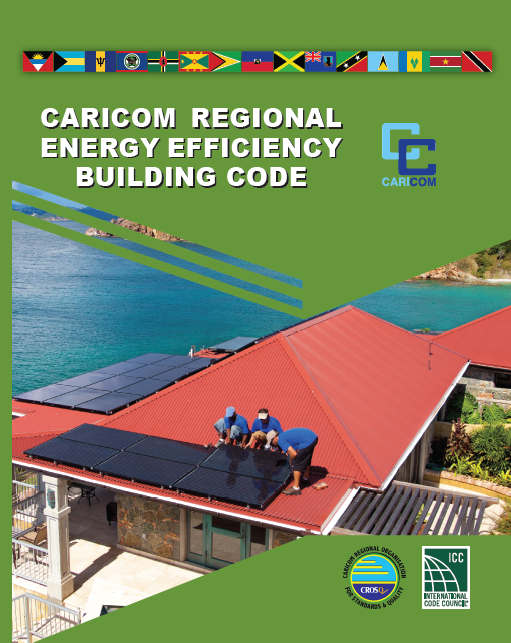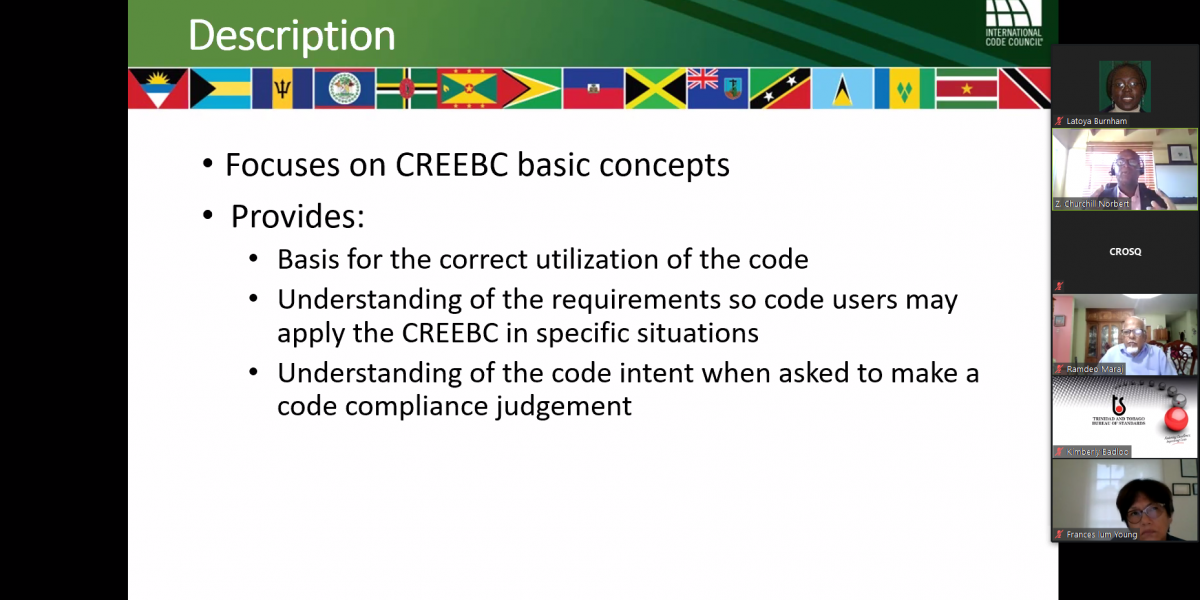Training of engineers, regulators, policymakers and other key stakeholders who will play primary roles in implementing the CARICOM Regional Energy Efficiency Building Code (CREEBC) has kicked into high gear in the latter half of 2020.
Even amidst the myriad of challenges presented by the COVID-19 pandemic, CROSQ, with funding from regional partners, namely the Energy for Sustainable Development (ESD) in Caribbean Buildings Project and the Technical Assistance Programme for Sustainable Energy in the Caribbean (TAPSEC), has been able to attract significant interest of the building sector who just want to know more about the Codes.
The CREEBC was approved by CARICOM Ministers of the Council for Trade and Economic Development in late 2018, with planning beginning for the unrolling of all the frameworks and programmes that would be needed to see to implementation thereafter in 2019. The Codes, which include adaptations of similar codes from the 2018 version of International Code Council, as well as the American Society of Heating, Refrigerating and Air-Conditioning Engineers 90.1 code, were essential tailored for the Caribbean region.

The first set of training was made possible by the ESD Project, involving its supported Member States of Antigua and Barbuda, Belize, Grenada, Saint Lucia and St Vincent and the Grenadines. With a curriculum developed by the ICC and delivered by CROSQ’s Head of the Regional Technical Committee for the Development of the Codes, Mr. Churchill Norbert, many professionals in these countries were able to take advantage of the training, with several asking for follow-ups and even extended sessions.
With the assistance provided through the TAPSEC Project, CROSQ was then able to respond to the demand, not just from these Member States, but engineers in others who also wanted their moment for in-depth training in the Codes. So in late October this year, the training was kicked into high gear with each of the remaining nine CARICOM countries being allotted their own national training schedule of five-day sessions on the Codes.
The idea, shared CEO of CROSQ, Mr. Deryck Omar, is to first and foremost respond to the needs of the Caribbean as far as responding to the high cost of energy is concerned, but also to ensure those who have to directly interface with the measures being put in place to address this energy situation are educated and informed to respond. This was critical, he noted in addressing professionals at the launch of the trainings, because a number of countries were already looking at adopting the CREEBC at the national level.
“It is expected that the 2018 CREEBC will eventually form part of a comprehensive suite of Caribbean Building Codes which will assist in adapting and building resilience to climate change . . . [I]n our drive to build capacity in Member States and facilitate the eventual national implementation of the Codes, . . . industry practitioners and experts will be trained on the 2018 CREEBC Requirements, and we hope that this training enables you to provide training to other stakeholders as necessary when required to. Additionally, we urge you to become advocates for the implementation of the 2018 CREEBC and to utilise the Codes in your work,” he said.
The benefits therein are two-fold:
- Each country will have a cadre of about 20 professionals trained in the Codes who can then train their counterparts in the specifics of the CREEBC; and,
- It will aid in smoothing the process of national adoption if those who are charged with interfacing with the Code, whether at the builders’ level, the inspection or regulation level or the policymakers’ level, already have an understanding of what the Codes entail.
Training will continue into 2021, to be concluded in the first half of the year with all Member States having had the opportunity to expose their professionals to the requirements of the Codes.

